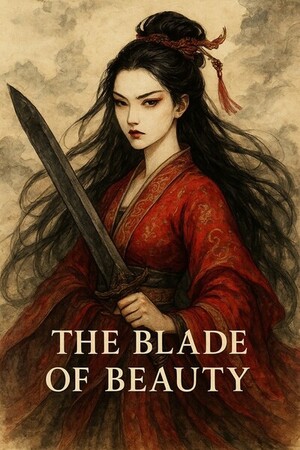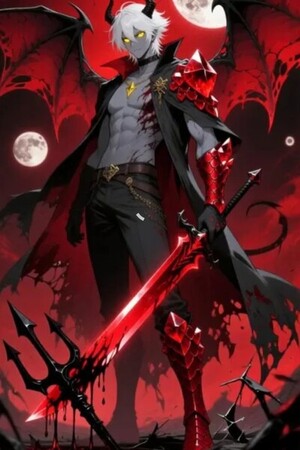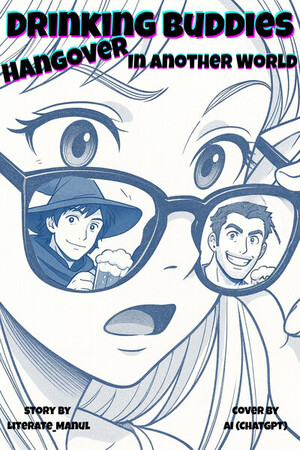Chapter 41:
The Massacre Under the Fireworks
I, a Hermaphrodite, Live by Taking Lives
If life could be divided into four seasons, then before the age of twelve, Kun Hong lived entirely in spring.
Before he turned twelve, Kun Buyu was the Grand Priest of Beiji Kingdom, holding an absolute position of authority—second only to the monarch, yet above tens of thousands. Kun Hong was his only son, destined to inherit this lofty seat one day. Although the four states of Yichuan were all considered secular kingdoms, Beiji was an exception. Strictly speaking, Beiji was a theocracy.
This naturally led to a long-standing contradiction between divine power and secular rule—a tension that had never truly been balanced across thousands of years. One represented the spiritual leader, the other the worldly sovereign. From birth, they were destined to stand on opposite sides.
That year, the new king of Beiji, Xue Liangbi, finally grew tired of sharing the world with another. His patience wore thin, and he set his sights on the Kun clan.
And everything began with a display of fireworks.
Like the other three nations, Beiji celebrated the New Year as the grandest festival of the year. To honor the occasion, Xue Liangbi imported hundreds of catties of Lin Stones from the Western Han Kingdom. Craftsmen fashioned them into fireworks that would bloom brilliantly in the night sky.
That evening, after families finished their reunion dinner, they gathered at their doorsteps, young and old pressing together, their faces lit with anticipation as they looked up at the heavens.
Boom!
A Lin Stone burst open high above, scattering into dazzling colors.
Lin Stones were a unique product of the Western Han. At first glance, they appeared ordinary, but once refined, they could be transformed either into weapons of death or into radiant fireworks that brought joy to thousands.
That night, Kun Buyu was also with his family. He sat in a pavilion with his wife Wan Xuexin and their son Kun Hong, the three dining together. As fireworks bloomed overhead, Kun Buyu slipped back into his role as a teacher. He told Kun Hong of an advanced illusion technique called “The Sundial.”
When cast, this technique would unleash a storm of starlight, turning night into day. Wherever the Sundial spread, corpses would cover the land. It was a powerful killing illusion, rarely to be used unless absolutely necessary.
Just as he finished speaking, Kun Buyu tapped his wine cup with a finger, signaling for more wine. Wan Ling, dutiful as ever, stepped forward with the wine pot, filled the cup obediently, and then silently retreated to her corner. She stood quietly, not disturbing a family gathering that had little to do with her.
But before Kun Buyu could continue his lecture, a blazing fireball suddenly arced over the wall. It landed in the pavilion before anyone could react. And then—
Swish, swish, swish!
A storm of arrows followed, tearing through the pavilion’s curtains and thudding into flesh. In an instant, those present were turned into pincushions.
Kun Buyu reacted swiftly. He seized Kun Hong and shoved him beneath the table. But Wan Xuexin had no such luck. She was struck head-on. A short arrow pierced through her left eye, nailing her to the beam behind her.
Kun Hong screamed.
It was already too late. Once the curtain of death is drawn, it cannot be closed again. More arrows rained down, their tips bound with firestones. Each strike landed with a sharp bang, igniting whatever they touched.
For all his power, Kun Buyu looked utterly disheveled in that moment. He was, after all, an illusionist—essentially a man of the mind. And like all mental workers, his physical strength was limited. Illusionists were formidable in open duels, dazzling enemies with their strange and overwhelming arts. But against assassins, in the dark of night, at a distance of tens of meters, a single arrow could bring them down like any ordinary man.
There was only one sensible option: run.
Kun Buyu grabbed Kun Hong, who was still frozen in shock, hoisted him onto his shoulder, and bolted. Only then did Kun Hong come to his senses. He cried out “Mother!” when he saw Wan Xuexin sprawled lifeless in her blood. Then, as his father carried him past, he saw Wan Ling—curled up behind a pillar, trembling violently.
Kun Hong reached out, wanting to pull her up, but with his small body slung over his father’s shoulder, he could do nothing. He could only watch as Wan Ling grew smaller and smaller in the distance, her tiny figure shivering in the cold wind.
He cried out, his voice breaking between sobs: “Father… save sister! Save sister!”
Kun Hong was, at his core, a kind soul. In times of mortal peril, most would abandon possessions—clothes, wealth, even steeds. Much like no one would drag an entire banquet table along while fleeing for their lives, Wan Ling, in this moment, was no different from that table: property of the Kun family. But Kun Hong, still too young, could not understand such cruel logic.
This was no accident. It was a massacre.
Flames erupted across the priest’s estate. Screams and steel clashed in a chorus of slaughter. Though I knew I was witnessing only an illusion, the heat and terror felt all too real. From the vantage of an old tree, Gongsun Bai and I watched the bloodshed below.
Assassins swarmed from every direction, catching the household off guard. The sheer crush of bodies, the relentless waves of attackers—this was my first time seeing how cheap human life could be. With a single slash, stab, or thrust, lives were harvested like crops.
Power struggles had always been built on mountains of bones.
I was no sentimental fool, but such naked brutality still unsettled me. Gongsun Bai cast me a glance and shifted slightly to block my view. “If it unsettles you, don’t look.”
I brushed his hand aside. “The more I see, the faster I’ll get used to it.”
He gave a thin smile. “Some things, no matter how often you see them, you’ll never get used to.”
Surprised, I looked at him. “You speak as though you’ve had plenty of experience.”
He flicked open his folding fan, voice calm. “Not much. But in the palace, I’ve seen more than enough. The brighter the gold on the surface, the filthier the rot beneath.”
My interest was piqued. “Go on.”
And so he told me a story—of an unfortunate man who had been hunted since birth. Assassinations, poisons, endless attempts on his life. The man never knew what crime he had committed to earn such hatred from the world, until he realized the truth: It wasn’t about crime. It was about identity. To sit in that seat was to carry that curse. He had no choice.
As he spoke, an explosion lit the night. Sparks cascaded, illuminating Gongsun Bai’s sharp nose and shadowed face. His voice dropped. “Once, someone even slipped brain-eating worms into his drink. Creatures that feast on gray matter. One sip, and—”
“—and he becomes an idiot, right?” I interrupted.
He blinked. “You knew?”
“I guessed the moment you started. You mean the infamous Prince Tianming, don’t you? The so-called imbecile prince? So that’s the truth behind the tale.”
Gongsun Bai paused. “…Something like that.”
I sighed. “Had I known, I’d never have mocked him. A tragedy like that… who could laugh?”
Below, the flames devoured half the estate. Kun Buyu, despite fighting valiantly, could not hold forever. He was no warrior, and illusions alone could not turn the tide. Arrows riddled his body, blood soaking his robes.
Loyal steward Yang Zhong rushed to shield him, only to be shoved aside. “Protect Kun Hong!” Kun Buyu barked.
Yang Zhong, jolted awake, roared: “Protect the young master!”
At once, the remaining guards formed a human wall, encircling Kun Hong. They fought desperately, blocking blades with flesh, sacrificing themselves one by one. Even as they fell, their bodies built a shield of blood and bone to guard the boy within.
The battle raged from dusk to dawn. Kun Hong stood at the center, watching the pool of blood at his feet deepen and thicken until daylight finally broke.
Boom!
The wall of flesh collapsed. Corpses stiffened where they fell. Kun Hong raised his red-rimmed eyes to the rising sun. There stood his father—hair disheveled, body broken, an arrow lodged in his robe. His eyes burned not just from sleeplessness, but from too much killing.
“Get up,” Kun Buyu growled, hoisting Kun Hong like a sack over his shoulder.
Kun Hong lay limp, wordless, until they reached the stables—now shattered by fire. No horses remained. Kun Buyu roared, fists clenched in helpless fury.
Then Yang Zhong appeared, leading a scrawny horse. Behind it, dragged across the snow, was a blood-drenched body—Wan Ling.
She looked as though she had been hauled from a vat of blood, her hands sticky with gore.
Kun Buyu’s eyes widened. Relief surged. He tossed Kun Hong onto the horse and prepared to mount.
Yang Zhong pleaded, “Master, take the girl too! I found her in Fushui Court, surrounded by the corpses of three or four assassins. None of them were whole—limbs severed, bodies mangled. I don’t know how she managed it, but look at her hands—the cracks between her fingers are full of flesh! She killed them, Master! Bring her with us. If danger comes again, she can buy us time to escape!”
Kun Hong, regaining his senses, tugged at his father’s robe and whispered, “Father… take her.”
Kun Buyu grunted, then reached down and hauled Wan Ling up like a sack. With one hard pull, he swung her onto the horse. A slap to its rump, and the beast bolted into the burning dawn.




Please sign in to leave a comment.